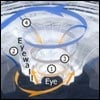The Rubin family’s post-Chanukah trip was abruptly cut short when they heard the news of a Category 2 cyclone heading towards their hometown of Cairns, Australia. The city, known as the gateway to the Great Barrier Reef, is one of the most remote regions on the planet and home to one of the most isolated Chabad centers in the world.
“We rushed to get back,” said Rabbi Ari Rubin, who co-directs Chabad-Lubavitch of Northern Queensland with his wife, Mushkie. They’d been driving along the east coast of Australia visiting isolated Jews sprinkled throughout the remote region when learned of the impending cyclone. “We had to make sure the community was prepared, that our home and Jewish center was secured with sandbags.”
The Chabad center in Cairns was established in 2016 as part of Chabad of Rural and Regional Australia (RARA), and the rabbi and his family have become accustomed to the long travel times that come with visiting Jews spread throughout the area. The route the Rubins were following is one of those trodden paths by the “Roving Rabbis” that Chabad of RARA has been sending to visit the area since 1977.
“We took the opportunity on a little post-Chanukah ‘holiday’ to visit some of the Jews of Mackay and Townsville City,” said Rubin. “But G‑d had other plans.”
A City in Ruin
High winds began buffeting Cairns, a small city of 150,000 on Australia’s northeast coast, on Dec. 14. Three days of torrential rains followed, but it was the flooding that came after that—unprecedented in Cairns’ recorded history—that laid waste to the city. Being situated in a tropical monsoon climate, the city was built to withstand extreme weather conditions but many local residents, including many from the tight-knit Jewish community, were devastated by the damage from the flooding.

Pamela Taylor-Ray, a mother of three, recounted her experience. “We were woken up on Sunday morning by a call to evacuate, but it was too late for us, as floodwaters surrounded us,” she said. “The streets were flooded, and my husband saw a five-foot crocodile chewing on a fish in our garage.”
The Taylor-Ray family loaded their children into the car and managed to evacuate from their home. But as they headed to a calmer part of town, their car broke down, and they were left stranded.
“The SES volunteers [State Emergency Service, Australia’s volunteer first-responders and civil defense organization] were great and took us in two little canoes to the main road, then by four-wheel drive [vehicle] to the shopping center, and finally, to a yacht club, where we met a patron called Michael, who incredibly offered us temporary accommodation in his granny flat, for free,” she said.
Members of the Jewish community, they then called Rubin, their local rabbi. By hashgacha pratis (“Divine Providence”), Rubin was on their side of town and quickly came to their aid. The family had fled with only what they’d had on their backs, their children still wearing the diapers they’d left the house in, and Rubin ferried them to his home where they could recover, clothe their kids and feel safe.
“It’s funny. One of the possessions I managed to save were my tichels [‘hair covering’] but unfortunately my siddur was turned into a brick and unsalvageable,” Taylor-Ray said.
The Taylor-Rays’ story is just one of many similar instances among the people of Cairns. “Some families lost their business but not their home. Some families lost their house and not their car. Some have insurance and some do not,” said Mushkie Rubin. “We are still hearing stories every day, and no two circumstances are alike.”

Spiritual Aid in Times of Material Struggle
Rubin has also been fielding many calls from community members and has provided guidance on religious matters, such as determining what items are considered sacred Jewish items that require proper burial.
“I got a call from an elderly woman who is staying in a motel in the city who lives by herself,” Rabbi Rubin, who is used to such calls having recently been sworn in as an army chaplain, related. “Once the flood waters receded a little and her immediate safety was ensured, she called to ask for help gathering her Jewish books for proper burial.”
The Rubins have been inundated with calls and texts from community members wondering what is going to be with regularly scheduled services, but the rabbi is proud to say that they are all on track to continue as before. Shabbat services and Jewish educational classes have already resumed, and Hebrew school—currently on summer break—is slated to begin as normal in the coming weeks.

With community members leaving their possessions behind in the scramble to get to safety, some were missing their essential Jewish items. Myra Gold, a guest at the Rubin household who’d been rendered homeless by the flooding, donated her Shabbat candlesticks to a family who lost theirs in the floods.
The Rubins’ home, which also serves as Chabad of Cairns, suffered some physical damage. Thankfully, the community’s precious Torah scroll remained safe and unharmed. It is notable as being the first ever for the Jews of Cairns when it was delivered in 2017.
The Queensland Jewish Board of Deputies (QJBD) teamed up with local hotels to gather linen, towels, food and other essential items for those in need. Rubin, whose car survived, has been making regular trips with his car “packed to the rafters” with staples turned into care packages that he’s been distributing, together with his children, to the people of Cairns.
“People from the community have been calling us to say they have things to give to others,” Rubin said, describing the sense of community spirit that has permeated the crisis. “These are people who just lost everything. They have to rebuild everything from scratch, and their first thought is how they could help others.”









Start a Discussion